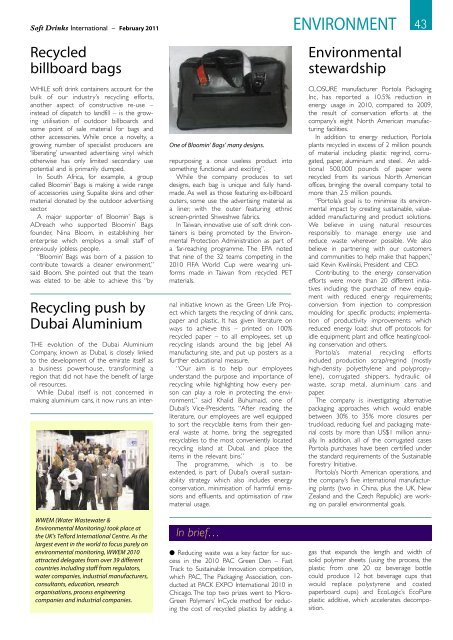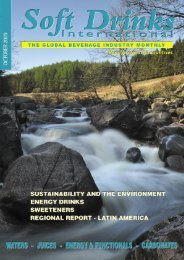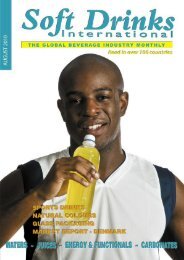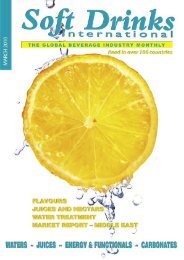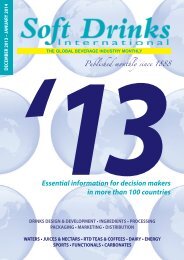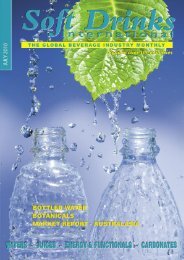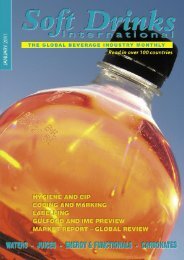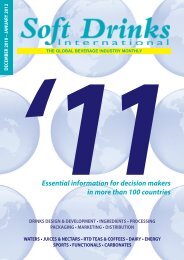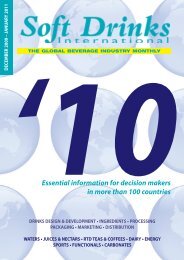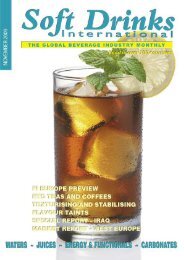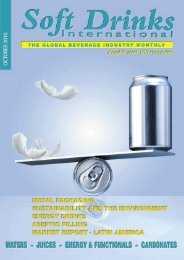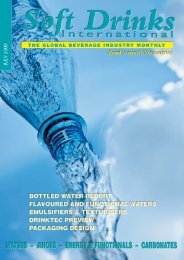Palatinose - Soft Drinks International
Palatinose - Soft Drinks International
Palatinose - Soft Drinks International
You also want an ePaper? Increase the reach of your titles
YUMPU automatically turns print PDFs into web optimized ePapers that Google loves.
<strong>Soft</strong> <strong>Drinks</strong> <strong>International</strong> – February 2011<br />
recycled<br />
billboard bags<br />
WHILE soft drink containers account for the<br />
bulk of our industry’s recycling efforts,<br />
another aspect of constructive re-use –<br />
instead of dispatch to landfill – is the growing<br />
utilisation of outdoor billboards and<br />
some point of sale material for bags and<br />
other accessories. While once a novelty, a<br />
growing number of specialist producers are<br />
‘liberating’ unwanted advertising vinyl which<br />
otherwise has only limited secondary use<br />
potential and is primarily dumped.<br />
In South Africa, for example, a group<br />
called Bloomin’ Bags is making a wide range<br />
of accessories using Supalite skins and other<br />
material donated by the outdoor advertising<br />
sector.<br />
A major supporter of Bloomin’ Bags is<br />
ADreach who supported Bloomin’ Bags<br />
founder, Nina Bloom, in establishing her<br />
enterprise which employs a small staff of<br />
previously jobless people.<br />
“Bloomin’ Bags was born of a passion to<br />
contribute towards a cleaner environment,”<br />
said Bloom. She pointed out that the team<br />
was elated to be able to achieve this “by<br />
recycling push by<br />
Dubai Aluminium<br />
THE evolution of the Dubai Aluminium<br />
Company, known as Dubal, is closely linked<br />
to the development of the emirate itself as<br />
a business powerhouse, transforming a<br />
region that did not have the benefit of large<br />
oil resources.<br />
While Dubal itself is not concerned in<br />
making aluminium cans, it now runs an inter-<br />
WWEM (Water Wastewater &<br />
Environmental Monitoring) took place at<br />
the UK's Telford <strong>International</strong> Centre. As the<br />
largest event in the world to focus purely on<br />
environmental monitoring, WWEM 2010<br />
attracted delegates from over 39 different<br />
countries including staff from regulators,<br />
water companies, industrial manufacturers,<br />
consultants, education, research<br />
organisations, process engineering<br />
companies and industrial companies.<br />
One of Bloomin’ Bags’ many designs.<br />
repurposing a once useless product into<br />
something functional and exciting”.<br />
While the company produces to set<br />
designs, each bag is unique and fully handmade.<br />
As well as those featuring ex-billboard<br />
outers, some use the advertising material as<br />
a liner, with the outer featuring ethnic<br />
screen-printed Shweshwe fabrics.<br />
In Taiwan, innovative use of soft drink containers<br />
is being promoted by the Environmental<br />
Protection Administration as part of<br />
a far-reaching programme. The EPA noted<br />
that nine of the 32 teams competing in the<br />
2010 FIFA World Cup were wearing uniforms<br />
made in Taiwan from recycled PET<br />
materials.<br />
nal initiative known as the Green Life Project<br />
which targets the recycling of drink cans,<br />
paper and plastic. It has given literature on<br />
ways to achieve this – printed on 100%<br />
recycled paper – to all employees, set up<br />
recycling islands around the big Jebel Ali<br />
manufacturing site, and put up posters as a<br />
further educational measure.<br />
“Our aim is to help our employees<br />
understand the purpose and importance of<br />
recycling while highlighting how every person<br />
can play a role in protecting the environment,”<br />
said Khalid Buhumaid, one of<br />
Dubal’s Vice-Presidents. “After reading the<br />
literature, our employees are well equipped<br />
to sort the recyclable items from their general<br />
waste at home, bring the segregated<br />
recyclables to the most conveniently located<br />
recycling island at Dubal, and place the<br />
items in the relevant bins.”<br />
The programme, which is to be<br />
extended, is part of Dubal’s overall sustainability<br />
strategy which also includes energy<br />
conservation, minimisation of harmful emissions<br />
and effluents, and optimisation of raw<br />
material usage.<br />
In brief…<br />
● Reducing waste was a key factor for success<br />
in the 2010 PAC Green Den – Fast<br />
Track to Sustainable Innovation competition,<br />
which PAC, The Packaging Association, conducted<br />
at PACK EXPO <strong>International</strong> 2010 in<br />
Chicago. The top two prizes went to Micro-<br />
Green Polymers’ InCycle method for reducing<br />
the cost of recycled plastics by adding a<br />
ENVIRONMENT<br />
Environmental<br />
stewardship<br />
43<br />
CLOSURE manufacturer Portola Packaging<br />
Inc, has reported a 10.5% reduction in<br />
energy usage in 2010, compared to 2009,<br />
the result of conservation efforts at the<br />
company’s eight North American manufacturing<br />
facilities.<br />
In addition to energy reduction, Portola<br />
plants recycled in excess of 2 million pounds<br />
of material including plastic regrind, corrugated,<br />
paper, aluminium and steel. An additional<br />
500,000 pounds of paper were<br />
recycled from its various North American<br />
offices, bringing the overall company total to<br />
more than 2.5 million pounds.<br />
“Portola’s goal is to minimise its environmental<br />
impact by creating sustainable, valueadded<br />
manufacturing and product solutions.<br />
We believe in using natural resources<br />
responsibly to manage energy use and<br />
reduce waste wherever possible. We also<br />
believe in partnering with our customers<br />
and communities to help make that happen,”<br />
said Kevin Kwilinski, President and CEO.<br />
Contributing to the energy conservation<br />
efforts were more than 20 different initiatives<br />
including: the purchase of new equipment<br />
with reduced energy requirements;<br />
conversion from injection to compression<br />
moulding for specific products; implementation<br />
of productivity improvements which<br />
reduced energy load; shut off protocols for<br />
idle equipment; plant and office heating/cooling<br />
conservation and others.<br />
Portola’s material recycling efforts<br />
included production scrap/regrind (mostly<br />
high-density polyethylene and polypropylene),<br />
corrugated shippers, hydraulic oil<br />
waste, scrap metal, aluminium cans and<br />
paper.<br />
The company is investigating alternative<br />
packaging approaches which would enable<br />
between 30% to 35% more closures per<br />
truckload, reducing fuel and packaging material<br />
costs by more than US$1 million annually.<br />
In addition, all of the corrugated cases<br />
Portola purchases have been certified under<br />
the standard requirements of the Sustainable<br />
Forestry Initiative.<br />
Portola’s North American operations, and<br />
the company’s five international manufacturing<br />
plants (two in China, plus the UK, New<br />
Zealand and the Czech Republic) are working<br />
on parallel environmental goals.<br />
gas that expands the length and width of<br />
solid polymer sheets (using the process, the<br />
plastic from one 20 oz beverage bottle<br />
could produce 12 hot beverage cups that<br />
would replace polystyrene and coated<br />
paperboard cups) and EcoLogic’s EcoPure<br />
plastic additive, which accelerates decomposition.


